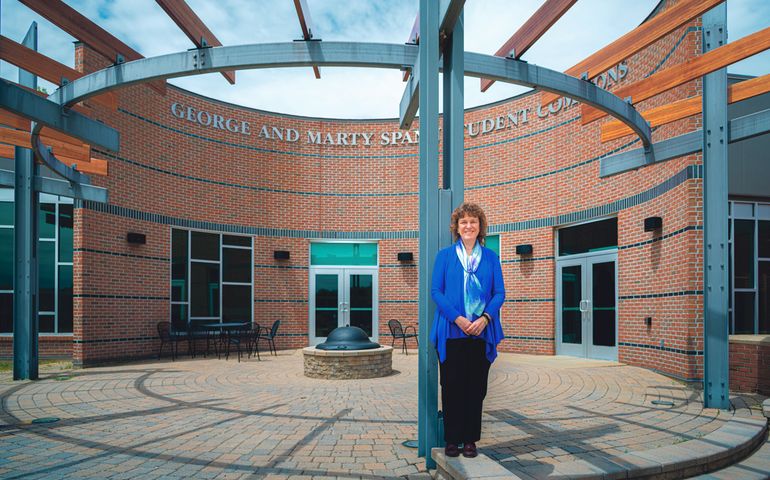
Class act in Waterville: How Thomas College grooms students for career success
 Photo / Jim Neuger
Laurie Lachance, president of Thomas College, has honed the college’s focus on preparing students for work life. "We’re all about careers," she says. "The students that we attract need to get employment."
Photo / Jim Neuger
Laurie Lachance, president of Thomas College, has honed the college’s focus on preparing students for work life. "We’re all about careers," she says. "The students that we attract need to get employment."
Alex Small worked in special education for a decade before enrolling in a new cybersecurity graduate program at Thomas College.
“What I was doing was exceptionally worthwhile and important,” says the 37-year-old, “but it wasn’t necessarily filling the coffers.”
That’s changed since he earned a master’s degree this May and landed a job as a consultant with the Waterville office of CGI Inc., a Montreal-based global IT firm. He got the offer while still working at the Augusta School District and searching for a summer internship related to his new degree.
“It’s nothing I expected to happen as quickly as it did, and I’ve loved every second of it since I started,” he says.
Besides enjoying the variety and being able to apply what he’s learned over the past 10 months, he’s glad to be making more money. “It’s enough to pay the bills and leave a little extra for fun,” he says.
Thomas College, led by President Laurie Lachance since 2012, launched the master’s in cybersecurity program last year as part of a broader goal of grooming students for career success. It does that inside and outside the classroom, supplementing a career-focused curriculum with opportunities for internships and professional development, and accelerated degree programs that get students into the workforce faster.
“We’re all about careers,” Lachance says. “We’ve always been that type of institution. The students that we attract need to get employment. They’re far less likely to graduate and then go tour the world backpacking. That’s not who we attract. We attract students who are anxious to get started on their careers. They have bills to pay, they have dreams to pursue and they demand results.”
Helping students turn a diploma into a job is so high-priority that Thomas College guarantees qualifying students will find employment within six months of graduating. Historically, it has a 94% placement rate in half that time.
That’s no small feat for a scrappy little school that gets more than half its revenue from tuition and fees, a world apart from more heavily endowed private colleges, including nearby Colby College.
Lachance says that while it would be easy to be overwhelmed by Colby’s financial might and community footprint, Thomas College also does its part, mainly by placing paid interns with local businesses through its Harold Alfond Center for Business Innovation.
“That’s an enormous gift to the region because it’s future workforce,” she says.
Setting out to ‘break the mold’
Sitting in her office with a wall plaque that reads, “If you’re lucky enough to be living in Maine, you’re lucky enough,” Lachance shares how she sought to “break the mold in higher education” at Thomas College. She’s the institution’s fifth president as well as the first woman and alum in that role. She earned an MBA at Thomas.
As president, Lachance started by having concrete walls in the administration building replaced with glass, and added a candy jar to lure students inside.
Every year during orientation week, new students come into her office to sign a matriculation book, a tradition carried out at other schools and adapted by Lachance at Thomas. Signing takes on greater meaning for the two-thirds of Thomas College students who are first in their family to go to college, many from rural communities.
“They become part of the history and realize the significance of it,” says Lachance, a first-generation college student herself.
Reflecting on her own undergraduate years at Bowdoin College, she recalls feeling out of place coming from humble roots in Dover-Foxcroft.
“I could do the academics,” she says, “but I didn’t have the social networks.”
Even in tennis, where she could hold her own, she didn’t have the right clothes or know proper etiquette like classmates from privileged backgrounds.
That, in part, was the inspiration behind her idea to introduce free golf lessons to Thomas College undergraduate seniors and one-year MBA students. It’s a six-week course that ends in a tournament with alumni and business leaders. Lessons are free for students who enroll in a networking course; they don’t just master a sport, they also gain valuable business skills.
“A lot of business takes place on a golf course, and if you’ve never had that in your history, you are at a disadvantage,” Lachance says, proud of the school’s elective golf guarantee. “I’m not guaranteeing you’re going to be a good golfer, I’m guaranteeing you’re going to have an opportunity to put another tool in your career toolkit that you don’t get at other schools.”
More than half of Thomas College students qualify for the job-guarantee program. It promises that students will find a job related to their major within six months of graduating, or get a break on student loans or tuition.
Students also have to hold up their end of the agreement, formalized in a contract, by meeting strict academic standards and by registering with Career Services, taking part in professional development, writing and updating a résumé and performing community service.
“If you do those things, guess what? You’re highly employable,” says Lachance, “It’s the use of a carrot rather than a stick.”
She says the school has rarely had to pay up in the program’s 20-year history.
“You don’t just make that kind of promise haphazardly,” says Ed Cervone, the new executive director of Thomas College’s Center for Innovation in Education. “You do it because you know it’s right and because you are producing graduates who are in high demand.”
Fast-track studies
Despite having no state funding, Thomas College has been a leader among Maine educational institutions in offering free college-level courses to high school students that many public colleges now offer as well.
It also offers eligible Thomas College undergraduates the chance to earn a degree in three years, or a master’s in four, which not only puts them on a faster career path but also saves a year in costs. Tuition plus room and board this past academic year was $38,150.
As of this year, Lachance says that all disciplines, including education, will offer accelerated degrees through the Kiest-Morgan Scholars Program.
A handful of students who chatted with Mainebiz in the library overlooking the campus commons said the Kiest-Morgan programs were a big factor in their college choice.
Alister Piccini, 19, of Winslow, who just finished his sophomore year, is an accounting major enrolled in the four-year program to earn a bachelor’s and a master’s, and said he chose Thomas College because it was the most affordable school he looked at.

He also says he went for accounting because “I didn’t want to be the ‘Wolf of Wall Street,’” and is taking classes this summer in business law and accounting.
Jimmy Sargent, 20, a third-year undergraduate finance major who’s minoring in accounting, will graduate next year with one internship under his belt and service at a local food bank. He’s not worried about his post-college path. “Having a guaranteed job lined up makes it far less risky,” he says.
Among non-business majors, 19-year-old Audrey Kimball is an English major going into her second year as a second-semester sophomore and hopes to get her degree in just 2 1/2 years of undergraduate study. Her extracurricular activities include giving tours of the campus she fell in love with at first sight. It happened while driving home from a day of visiting other colleges — an impulse stop suggested by her mom. Kimball now thinks of Thomas College as home, saying: “I knew that it would be a place I could thrive, and I haven’t once regretted my decision.”

Gainful employment
Among Class of 2019 graduates settling into new jobs is Makenzie Carlow, a management degree recipient now working as a deposit operations specialist at Kennebec Savings Bank, which she had gotten to know through internships. Her father and brother also attended Thomas College, and she hopes to go back for her master’s.
“It was definitely a good stepping stone to get me into my future,” she says.
Back at CGI, Alex Small says he enjoys explaining cybersecurity to clients who don’t necessarily understand technology and applying what he learned at Thomas College. He’s not the only graduate to work or intern at the company, which plans to keep looking for new hires at the school in its own backyard.
“We want to be a lot larger than 30 people,” says Joshua Karstens, director of consulting for CGI’s New England business unit in Waterville. “To have that talent pipeline so close to us is beneficial to our growth.”













0 Comments